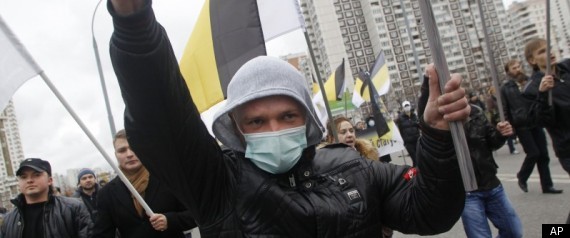
Russian Neo-Nazis ‘Celebrate’ Hitler’s Birthday, Part Two: April 20, 2013
Publication: Eurasia Daily Monitor Volume: 10 Issue: 80
By:

Adolf Hitler’s birthday, traditionally a concern for authorities determined to prevent racist violence in Russia (see Part One of this two-part article in EDM, April 15), appears to have passed without much disruption in 2013. At the time of writing, there were relatively few reports of “celebrations” and no news accounts of racist violence directly connected to the Fuehrer’s birth. This is possibly due to the increased media attention given to the regions of Dagestan and Chechnya in the wake of the arrest of the Dzokhar Tsarnaev, one of the alleged Boston Marathon bombers: the media had their attention elsewhere. Of course, the lack of overt “celebration” could also be due to more effective policing of the activities of Neo-Nazi groups in Russia, which the government has been pursuing with greater zeal since 2010. For instance, on April 12, the procurator of St. Petersburg added articles from Hitler’s Mein Kampf that have appeared on the Russian social networking site Vkontate.ru to the list of materials banned under article 282 of the Russian constitution, which forbids incitement of racial or religious intolerance (https://ria.ru/incidents/20130412/932357545.html). However, given attempts by the international Far Right to present Russia as another “front” in the struggle for white civilization, a vengeance attack for the Boston bombings on Caucasians (referred to by their derogatory Russian epithet, cherny, meaning “black”) in Russia by Neo-Nazi groups is not out of the question.
This is not to say that there was no violence this year whatsoever. On April 18, a fight broke out between fans of the soccer team from Rostov-on-Don and Caucasian fans supporting the FC Terek Grozny (Chechnya) team, allegedly started after the Rostov fans began chanting “Seig Heil!” (https://www.sova-center.ru/racism-xenophobia/news/racism-nationalism/2013/04/d26946/). As a result of the fight, two of the Terek Grozny fans were hospitalized with serious wounds to the face and head. In another case, in the center of St. Petersburg on April 21, three young men, one of whom had a shaved head and all of whom had bovver boots and black jackets, inflicted serious wounds on two people who were of “non-Slavic appearance” (https://www.sova-center.ru/racism-xenophobia/news/racism-nationalism/2013/04/d26948/). While such events are terrible, they are not the sort of systemic violence that induced Russian authorities to warn dark-skinned foreign students not to leave their dormitories on Hitler’s birthday, a practice that started in 2002.
Others commemorated the day in a more peaceful (though still offensive) fashion. In St. Petersburg, fans of the “Zenit” team unveiled a banner on April 17 in a soccer match against Kuban FC, displaying a symbol popular with Neo-Nazis. On April 18, fans of the Voronezh side unveiled a banner with a Celtic Cross, another symbol popular with skinheads and the white internationalist movement. On April 21, in a match between CSKA Moscow and Spartak, both sets of soccer fans had banners supporting racism: the CSKA fans held up a Celtic Cross and the Spartak fans had a banner proclaiming: “support against tolerance” (https://www.sova-center.ru/racism-xenophobia/news/racism-nationalism/2013/04/d26947/). In Voronezh, on April 20, Neo-Nazis unveiled a banner on a bridge with a portrait of Adolf Hitler, a swastika, and the caption, “Happy Birthday, Hitler” (https://www.sova-center.ru/racism-xenophobia/news/racism-nationalism/2013/04/d26945/). The association of soccer with racism is well-established, and in 2010, a protest at the murder of Spartak Moscow fan Yegor Svidorov by people from the Caucasus allowed Neo-Nazis to organize protests that drew 5,500 on Manezhnaya (Manezhka) Square outside the Kremlin. While the association between soccer and racism is not constrained to Russia, other countries have taken steps to prevent it. The overall moderate tone of events is summed up by the fact that a photograph of a cake with swastika icing, baked by students in Kirov, attracted attention on the internet (https://www.pro-goroda.ru/sobytiya/den-rozhdeniya-gitlera-studenty-ispekli-tort-so-svastikoy-14039). If confectionary counts as news, then there is very little else to report.
The relative calm on Hitler’s birthday in 2013 could reflect a change of strategy in the Russian Far Right—a move away from street violence toward political participation based around removing Putin from the Kremlin. The nationalists realize they are gaining in popularity as the only serious opposition to the regime, and some commentators argue that the next Duma will see a nationalist caucus making up as much as 10 percent of the votes (https://svpressa.ru/politic/article/66135/). Certainly this hypothetical change of strategy would be in line with the 2011 visit of skinhead gang leader Dmitrii Demushkin to Chechnya and embrace of Chechens as people with whom Russian nationalists share values (https://www.apn.ru/publications/article25954.htm). The presence of the nationalists in the protests against Putin (Alexei Navalny, whose slogan “stop feeding the Caucasus!” took pride of place in last year’s protests, is an ideologue of Russian nationalism) suggests that they find elections a more promising route to power than direct street action. Indeed, the nationalists seem to be more concerned with planning for another “day of protest” against the Putin regime on the traditional holiday of May 1, than with celebrating Hitler’s birthday. Protests are planned for at least three Russian cities—Volgograd, Astrakhan and St. Petersburg (https://www.dpni.org/articles/novostnaya/35574/)—under the banner of Imperial Russia (a black, yellow, and gold striped flag, which is a symbol of the far-right Movement Against Illegal Immigration—DPNI). The continued involvement of the nationalists in protests against Putin is, thus, clear. Hitler’s birthday in 2013 may have passed off relatively peacefully, but that is no guarantee for other events this year.




